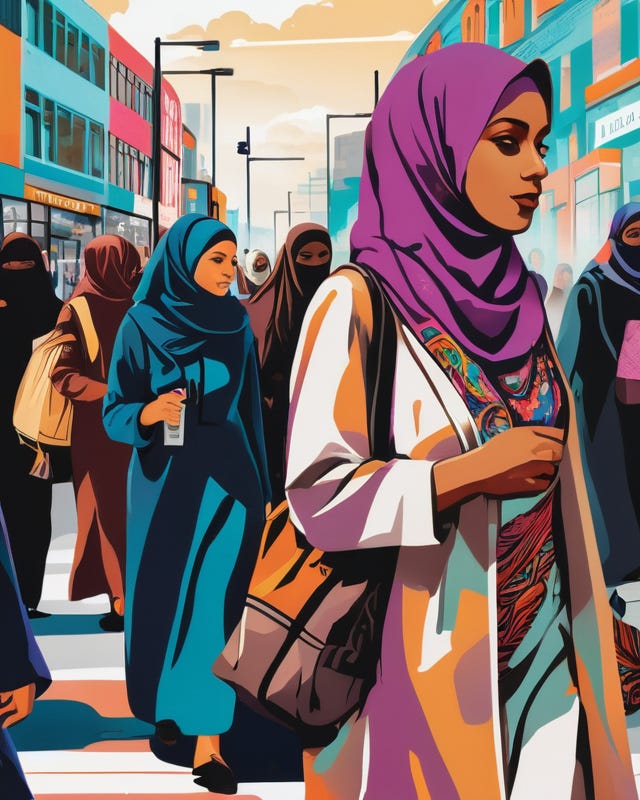What's Really Driving Muslim Women Away from Faith?
On Feminism, Oppression and Male-Centred Islam
Yesterday, I stumbled upon a twitter thread. It got me thinking, and honestly, it got me a little triggered too. The thread explored why some women’s faith takes a hit when they start embracing feminism. I was like “ugh!… here we go again”. At first, it sounded like one of those infuriating conversations about the incompatibility of feminism and Islam. But as I read along, one part struck me. The author of the thread had been in conversation with a woman who stated that “If your Imaan isn't rooted in love for Allah, but instead, in the performance of religion for men, the decentring of men in your life often feels like a decentring from Islam."
I stopped. And read it again. This time, slowly and deliberately. It was profound, powerful and mind-blowing. It confirmed what I had already known. My own journey had revealed this truth. When your faith is more about performing for men than loving Allah, ditching the patriarchy feels like ditching Islam altogether.
Simple yet complicated, liberating yet terrifying. Faith in the unknown demands courage. Real faith isn't about regurgitating dogma; it's about dissecting, questioning, and seeking truth. It's a journey, not a destination – one that inevitably leads to a crisis. But here's the thing: a crisis of faith isn't necessarily a bad thing. In fact, I've come to realise that being born into your faith isn't a privilege; it's a precursor to intentional choice. We all, eventually, choose our beliefs, and that's where true faith begins.
We've all been there - indoctrinated into a faith that centres men. It was there in the sermons; obey your husbands, wear hijab to protect men from temptation, fulfil their sexual desires, and serve them to earn your way to Jannah. That was the faith I grew up with; overbearing and extremely uncomfortable. But along the way, as I began to explore my faith intentionally, I started to ask questions; questions that shook the foundations of everything I had been taught. These questions would isolate and alienate me from the community. It would make people point fingers at me. They would ask the other women to stay away from me if they wanted to keep their faith. To the community, I was going astray, but deep down, I was on a journey. Like an old building undergoing renovation, the old structure had to be dismantled to make way for the new. And that's exactly what was happening within me.
This conversation takes me back to an essay I wrote four years ago, during Ramadan, for Sisters from AARP. I mentioned how it was my fight for equality and justice that deepened my relationship with Allah and fuelled me with the courage to forge ahead in a world that tries to take everything from me.
It can feel like feminism is pulling you away from Islam, but that's an illusion. In reality, it's liberating you from a male-centered interpretation of Islam. It’s breaking you free from oppressive cultures hidden under the guise of your faith. Your questions are guiding you toward the authentic, God-centered Islam – one that focuses on pleasing the Divine, not societal expectations.
And if I’m going to be honest, this journey is daunting. But I can attest that confronting your fears and doubts head-on is transformative. Once you face those demons, you'll emerge stronger, wiser, and more grateful for the courage to forge ahead.
So, here’s what I’m going to say in response to that Twitter thread. The real culprit pushing women away from Islam isn't feminism. It’s oppression. It's heartbreaking that our community chooses to ignore this elephant in the room, instead blaming women for seeking change. Misogynistic sermons, biased judgments in Shari'ah courts, and oppressive family structures force women to question whether Allah sanctions their subjugation.
From the pulpits, men are emboldened to dehumanize and marginalize women, justifying their actions with distorted interpretations of Islamic texts and oppressive fatwas. How, then are the women confronting this ugly reality and working towards a more inclusive, compassionate Islam that honors the dignity of all believers, the enemy? This is the question we all need to ask.
In the end, faith-centred feminism is a journey. On this journey, you will not only uncover and dismantle all structures of oppression, you will also find your faith and deepen your relationship with Allah. You will shed the need for human approval and instead, stand accountable only to God. This is a faith that values your relationship with the Almighty above your standing with men. And this is a profoundly empowering realization.





I feel like there isn’t enough honest conversation in the Muslim community about the bias that exists or can exist, against women, within it. We can’t have a conversation about how the tafseer of an ayah could’ve been affected by cultural norms and bias against women. Despite us all being humans and imperfect, We can’t have this conversation. Why do we pretend like our scholars were immune to anything human? Any human bias? We can’t fight for justice for women because the Muslim community refuses to be critical and prefers living in cognitive dissonance.
I had a very insightful and interesting read, considering the fact that I am a teenage Muslimah, and I am still on my "journey" to getting answers that would further grant me understanding of feminism in Islam. I also agree that these issues that are kept "unsolved" have to be addressed.
I'd really love to hear/know what your definition of feminism is, if you will...